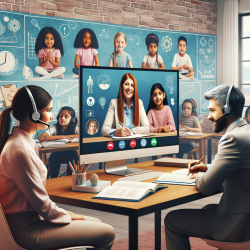Introduction
In the wake of the COVID-19 pandemic, the term "lockdown" has become a part of our everyday vocabulary. The research article "Lockdown and sustainability: An effective model of information and communication technology" offers valuable insights into how information and communication technology (ICT) can be leveraged to improve outcomes during such crises. For practitioners in the field of online therapy, particularly those working with children, these insights can be transformative.
Understanding the Research
The study identifies four paradigms that influence human behavior during lockdowns: Source Derogation and Argument (SDA), Tangible Need and Deficiency (TND), Intangible Desire and Expectancy (IDE), and Evaluation of Benefit and Loss (UBL). These paradigms provide a framework for understanding why people may not adhere to lockdown measures, and they offer a lens through which practitioners can view the challenges faced by their clients.
Applying the Research to Online Therapy
For online therapy providers like TinyEYE, these insights can inform strategies to enhance engagement and effectiveness. Here are some practical applications:
- Addressing Source Derogation and Argument (SDA): Building trust is crucial. Therapists should ensure that communication with clients is clear, credible, and empathetic. By establishing themselves as trustworthy sources, therapists can encourage clients to engage more fully with therapy.
- Meeting Tangible Needs and Deficiencies (TND): Understanding the tangible needs of clients, such as access to technology or a quiet space for therapy, is essential. Practitioners can work with families to identify and mitigate these barriers, ensuring that therapy is accessible and effective.
- Recognizing Intangible Desires and Expectancies (IDE): Children, in particular, may have emotional needs that are not immediately apparent. Therapists should be attuned to these desires and incorporate activities that address emotional well-being, such as games or creative exercises.
- Evaluating Benefits and Losses (UBL): Therapists can help clients weigh the benefits of continued therapy against the challenges posed by the lockdown. By highlighting the positive outcomes of therapy, practitioners can motivate clients to persist despite difficulties.
Encouraging Further Research
While the current research provides a strong foundation, further studies are needed to explore how these paradigms specifically impact online therapy for children. Practitioners are encouraged to engage in research initiatives or collaborate with academic institutions to expand the evidence base.
Conclusion
By integrating the findings from "Lockdown and sustainability: An effective model of information and communication technology," online therapy practitioners can enhance their practice and improve outcomes for children. This data-driven approach not only addresses immediate challenges but also contributes to the long-term sustainability of online therapy services.
To read the original research paper, please follow this link: Lockdown and sustainability: An effective model of information and communication technology.










